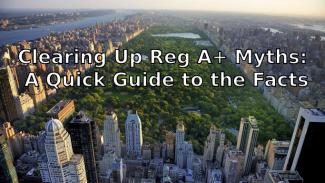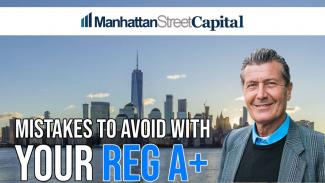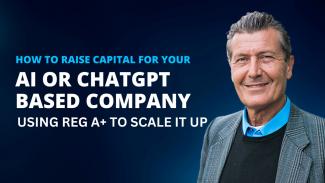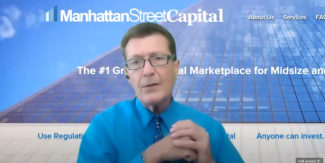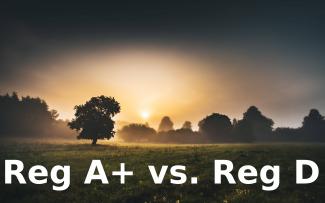
The Reg A+ and Reg D SEC exemptions allow companies to raise capital using broad-based, practical, online marketing. Let's explore the pros and cons of each.
Reg D 506b and Reg D 506c
For online equity crowd investing purposes, Rule 506 is the most significant - it has two different variations, 506b, and 506c. In each case, only accredited investors are allowed to invest. In Reg D, the Issuer company is allowed to make reasonable predictions about its intended growth and future plans (generally not allowed in Reg A+). Because Reg D 506c allows better access to offerings online by the public for viewing purposes, it makes sense to compare Reg D 506c with Reg A+.
With a Reg D 506c offering, the company can raise unlimited capital, but only from accredited investors.
- It is allowed for the issuing companies to promote and advertise their offerings far and wide with few limitations.
- The issuer companies have to take steps to verify that the investors are accredited. The investors must provide proof that they are accredited.
- Although the companies don't need to register with the SEC, they have to file a Form D, which includes information about the company's offering, promotors, the companies themselves, and some further information about the offerings. Form D is a notice filing. You do not wait for the SEC to respond. They do not. As a result, the legal documents can be prepared relatively quickly.
With a Reg D 506b offering, the company can raise unlimited capital, primarily from accredited investors.
- The company is limited to marketing its offering to people that it already knows are accredited investors and that it has a relationship with. You cannot simply buy a list of accredited investors and market to them. So general advertising and promotion is not allowed.
- Investors are allowed to self-state that they are accredited.
- Up to 35 non-accredited investors are allowed with certain steps taken to ensure they are aware of the risks they are taking by investing.
- Although the companies don't need to register with the SEC, they have to file a Form D, which includes information about the company's offering, promotors, the companies themselves, and some further information about the offerings. Form D is a notice filing. You do not wait for the SEC to respond.
Now let's explore Reg A+
Regulation A+ is a relatively new way to raise capital authorized by SEC regulations in the summer of 2015 as part of the Jumpstart Our Business Startups Act (JOBS Act). With Reg A+, companies can raise up to $75 million per entity per year online from investors of any wealth level worldwide.
With Reg A+ Tier 2 companies can raise $75 million/year from accredited AND non-accredited investors.
- Anyone can invest worldwide
- The company can publicly advertise
- No state Blue Sky filing permissions are required
- Requires Audited Financials that go back two years (less for new companies)
- The company has to file a Form 1-A with the SEC, and if the offering is Qualified by the SEC, the company can start its online fundraising campaign, which can last from one to three years.
- The company has to file annual US-GAAP audits and six-monthly Management Financials, and any significant changes in the business must be reported promptly.
Reg A + Liquidity
The Reg A+ shares are considered liquid, so investors are allowed (by the SEC) to sell their shares, but the liquidity depends on what the issuer company does after the offering. If the company lists the shares on the NASDAQ, the NYSE, or an OTC market, then the Reg A+ shares can be sold easily. These listings can be made as part of the Reg A+.
An easier method for providing investor and insider liquidity is to list on an Alternative Trading System (ATS) - there are no short sales allowed on ATS, and listing costs can be lower than on the bigger exchanges. So they can be well suited to younger companies that are not yet ready for the challenges of being listed on the major exchanges.
The Issuer company may choose to offer direct liquidity to their investors by defining in their Form 1-A (called the Offering Circular once SEC Qualification is achieved) what valuation method they will use and what other restrictions will apply. This type of liquidity is regulated by Regulation M.
Reg D Liquidity
The securities sold in a Reg D offering are "restricted" under US securities law and cannot be easily resold for the first year.
Lockup restrictions are reduced for people or entities who are not affiliates after a year has passed since the securities were first acquired from the issuer (company). It is important to know that there are exceptions to the one-year lockup in the Reg D context - four such exceptions are listed below; Holders of restricted securities of non-reporting companies who are not affiliates, (affiliates are a type of insider) may resell in the following ways:
- Privately in sales under the so-called "Section 4 (1 ½) exemption", typically only to other accredited investors and based on an opinion of counsel at any time;
- Privately under Section 4(a)(7) of the Securities Act to accredited investors at any time;
- Privately to "qualified institutional buyers" under Rule 144A at any time;
- Publicly under Rule 144, one year after the securities were issued
You can read more about Reg D liquidity here
Advantages and disadvantages of Reg D and Reg A+
Reg D can be faster to prepare, while in the case of a Reg A+, the audit, legal and marketing preparations can take 4 to 5 months.
In Reg D, there is no limit on how much you can raise; in the case of Reg A+, the maximum is $75m/year.
With Reg A+ you can take your company public to the NASDAQ or NYSE and to other exchanges.
With Reg D, there are no reporting requirements after the offering.
With Reg A+, you can market your offering to non-accredited investors who are easier to reach and more likely to engage with your offering. Accredited investors have many investment opportunities, so getting their attention is often more expensive in marketing spend.
With Reg A+, people of any wealth level can invest.
Reg D is less expensive to prepare because there are no audit requirements, and you don't have to navigate through the SEC Qualification process required in Reg A+. Form 1-A with the SEC.
What is Manhattan Street Capital
We assist companies through the whole capital-raising process to achieve a successful offering. Our website technology integrates the necessary services so companies can make their Reg A+ and Reg D offerings work efficiently.
If you want to learn more, please visit our FAQ page or contact us.
Here are some links that you might find useful.
Reg A+
Reg A+ Offering Schedule Guide
Reg A+ Cost Guide
How to get a broker-dealer for a 1% commission
Interactive, clickable video on how to use Reg A+ from start to completion
Reg D
What Is The Timeline or Schedule For A Reg D Offering?
How much does a Regulation D offering cost?
(1).jpg)
Rod Turner
Rod Turner is the founder and CEO of Manhattan Street Capital, the #1 Growth Capital service for mature startups and mid-sized companies to raise capital using Regulation A+. Turner has played a key role in building successful companies including Symantec/Norton (SYMC), Ashton Tate, MicroPort, Knowledge Adventure and more. He is an experienced investor who has built a Venture Capital business (Irvine Ventures) and has made angel and mezzanine investments in companies such as Bloom, Amyris (AMRS), Ask Jeeves and eASIC.
www.ManhattanStreetCapital.com
Manhattan Street Capital, 5694 Mission Center Rd, Suite 602-468, San Diego, CA 92108.


